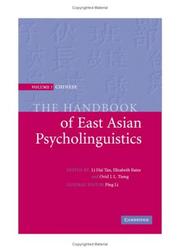| Listing 1 - 2 of 2 |
Sort by
|
Book
ISBN: 0898590892 9780898590890 Year: 2009 Publisher: New York Psychology Press
Abstract | Keywords | Export | Availability | Bookmark
 Loading...
Loading...Choose an application
- Reference Manager
- EndNote
- RefWorks (Direct export to RefWorks)
Sino-Tibetan languages --- Chinese language --- -English language --- -Psycholinguistics --- Thought and thinking --- Mind --- Thinking --- Thoughts --- Language, Psychology of --- Language and languages --- Psychology of language --- Speech --- Psychological aspects --- Psychology --- English language --- Psycholinguistics --- Linguistics --- Educational psychology --- Philosophy --- Intellect --- Logic --- Perception --- Self --- Psycholinguistics. --- Thought and thinking. --- Psychological aspects. --- Germanic languages --- Chinese language - Psychological aspects --- English language - Psychological aspects

ISBN: 9780511550751 9780521833332 9781107405813 9781139076838 1139076833 9781139136150 1139136151 0521833337 9780521833349 0521833345 9780521833356 0521833353 1283112043 113907458X 9786613112040 0511550758 1139081381 1139079115 1139068792 1316086054 1107504570 1316086062 9786612948206 0511900872 0511901666 0511799888 0511797117 0511758650 1282948202 0511798512 1107405815 9780511901669 9781316086063 9781282948204 6612948205 9780511758652 9780511900877 9780511798511 9780511797118 9780511799884 Year: 2006 Publisher: Cambridge : Cambridge University Press,
Abstract | Keywords | Export | Availability | Bookmark
 Loading...
Loading...Choose an application
- Reference Manager
- EndNote
- RefWorks (Direct export to RefWorks)
A large body of knowledge has accumulated in recent years on the cognitive processes and brain mechanisms underlying language. Much of this knowledge has come from studies of Indo-European languages, in particular English. Japanese, a language of growing interest to linguists, differs significantly from most Indo-European languages in its grammar, its lexicon, and its written and spoken forms - features which have profound implications for the learning, representation and processing of language. This handbook, the second in a three-volume series on East Asian psycholinguistics, presents a state-of-the-art discussion of the psycholinguistic study of Japanese. With contributions by over fifty leading scholars, it covers topics in first and second language acquisition, language processing and reading, language disorders in children and adults, and the relationships between language, brain, culture, and cognition. It will be invaluable to all scholars and students interested in the Japanese language, as well as cognitive psychologists, linguists, and neuroscientists.
Psycholinguistics --- S14/0805 --- S15/0200 --- S15/0210 --- S15/1250 --- Language, Psychology of --- Language and languages --- Psychology of language --- Speech --- Linguistics --- Psychology --- Thought and thinking --- China: Education--Teaching Chinese to Chinese --- China: Language--General works --- China: Language--Special linguistic subjects --- China: Language--Teaching Chinese to Foreigners --- Psychological aspects --- East Asia --- Asia, East --- Asia, Eastern --- East (Far East) --- Eastern Asia --- Far East --- Orient --- Languages --- Psycholinguistics. --- J5009 --- Japan: Language -- theory, methodology and philosophy --- Arts and Humanities --- Language & Linguistics --- Japanese language --- Psychological aspects. --- Koguryo language
| Listing 1 - 2 of 2 |
Sort by
|

 Search
Search Feedback
Feedback About
About Help
Help News
News